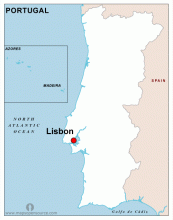Country report and updates: Portugal
Updated October 2017
Issues
- Portugal does not recognise the right to conscientious objection for professional soldiers.
1 Conscription
With Law 174/1999 (Law on Military Service, Lei do Serviço Militar) 1 Portugal abolished conscription and started a transformation process into fully professional armed forces. The last conscripts were called up for military service in 2004. Since November 2004, the armed forces consist of professional soldiers only. In fact, conscription is presently not enforced.
However, according to Article 11 of Law 174/1999, male and female Portuguese citizens have to attend a National Defence Day (Dia da Defesa Nacional), which is aimed at giving information on national defence and the role of the Armed Forces 2.
professional soldiers
Recruitment is regulated by Law 174/1999. Only Portuguese citizens who are at least 18 years old can apply to join the Armed Forces, either for a contract service or a voluntary military service. Contract service lasts for an initial period from two to six years, and can be extended to a maximum of 20 years of service (Article 28). Voluntary military service lasts 12 months (Article 31).
2 Conscientious objection
Conscientious objection for conscripts
The right to conscientious objection was legally recognised in 1976. Legal provisions on conscientious objection were laid down in Law 7/1992, last changed with Law 138/1999 in August 1999 3.
This law only applies to conscripts. CO applications could only be made before starting military service. Article 13 practically excludes professional soldiers from claiming the right to conscientious objection. According to this Article, the right to conscientious objection does not apply to those whose work includes bearing arms, have a licence to do so or whose work is connected with the manufacture of arms and armaments.
An application can be made using a simple form, which can be downloaded from the internet 4. While conscription is not being enforced, an application for conscientious objection frees an objector from any military obligation, including the National Defence Day 5.
Conscientious objection for professional soldiers
There are no legal provisions for the right to conscientious objection for professional soldiers.
The rules for leaving the Armed Forces prematurely are presently not known.
3 Draft evasion and desertion
Articles 72-74 of the Military Penal Code deal with desertion, and the potential punishments. According to article 74, desertion can be punished with prison from one to four years in times of peace, and from two to eight years in times of war. The punishment for officers is higher6.
Notes
1 http://www.mdn.gov.pt/NR/rdonlyres/EE0812AB-BC25-4A4D-9270-211E9AFF60CF/0/LSM.pdf, accessed 25 April 2008
2 Ministry of Defence: Dia da Defesa Nacional, http://www.mdn.gov.pt/mdn/pt/Recrutamento/dia/, accessed 25 April 2008
3 Lei n.o 138/99: Primeira alteração à Lei n.o 7/92, de 12 de Maio, que regula a objecção de consciência, http://tinyurl.com/5yzf9w, accessed 25 April 2008
4 http://juventude.gov.pt/NR/rdonlyres/0A553494-9799-4D56-AED8-E8CE2E4D6531/795/anexos2de2.rtf, accessed 25 April 2008
5 Juventude.gov.pt: Quais os efeitos da entrega da Declaração de Objecção de Consciência?, http://www.juventude.gov.pt/Portal/OutrosTemas/ObjeccaoConsciencia/, accessed 25 April 2008
6 Lei n.o 100/2003: Aprova o novo Código de Justiça Militar e revoga a legislação existente sobre a matéria, http://www.pgdlisboa.pt/pgdl/leis/lei_mostra_articulado.php?nid=120&tabela=leis, accessed 25 April 2008
Recent stories on conscientious objection: Portugal
In this presentation I will give an overview of the right to conscientious objection, its
legal practices and frameworks in the 27 European Union member states. Before I do so, I want to step back a bit and have a brief look at the existing international standards about the right to
conscientious objection, as these standards allow us to put the practices in the EU member states into a perspective.
